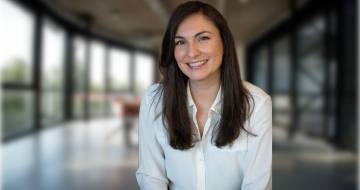BARBRI’s director of learning, Alisa Gray, discusses the skills that make an excellent lawyer, how students should be using AI and shares her expert advice for learning and development professionals

“The difference between someone that’s just academically brilliant and someone who is an excellent lawyer is all to do with how they relate to other people,” says Alisa Gray, director of learning at BARBRI. Banking lawyer turned legal education expert, Gray designs and delivers BARBRI’s legal and business skills programmes, setting up the next generation of young lawyers for success.
Gray read English at Oxford University before turning her thoughts to the law – she completed a training contract with boutique banking firm Wilde Sapte and after qualification joined the banking and finance team at Allen & Overy. She reflects enthusiastically on her time in practice: “I was lucky enough to find a fantastic firm to train with,” she says, “and when I moved to A&O, I absolutely loved it there as well. I did lots of really big high-profile deals and really enjoyed it, it was great!”
After 5 years at the magic circle firm, juggling a demanding job with family life, Gray’s career focus changed. She moved into learning and development, setting up the global finance training programme at Linklaters. “I’m very interested in being with people,” she tells me, “I really enjoy helping people learn.” Meanwhile, this role allowed her to remain in the City law firm environment she found so rewarding, “I really enjoyed working in the City – it’s great. It’s wonderful to be surrounded by such ambitious, motivated, clever people.”
After leaving Linklaters to look after her young family, Gray entered the world of legal education. While working with Kaplan to develop the Qualified Lawyers Transfer Scheme (QLTS) exams, she completed a master’s degree in organisational psychology, pursuing her interest in people and how they learn.
Since 2021, Gray has been director of learning at BARBRI, leveraging this wealth of experience to get the best results from their students:
“I use my experience as a banking lawyer, and being in practice, and creating training programmes within a large law firm, combined with my knowledge of organisational psychology to really focus on the skills that junior lawyers need.”
So what are these essential skills? “A lot of it comes down to interpersonal skills; it really does,” Gray responds. She is careful to avoid dismissing the importance of legal expertise, emphasising that “you need to be really good at the law – that is absolutely essential,” but continues, “to be an excellent lawyer, it’s all about human skills.”
Amid the rapid development of AI technology, Gray sees interpersonal skills as increasingly important. “In an age of AI, in which we’ve got incredible access to content and information, what actually matters is, not having an encyclopaedic knowledge of information, it’s the ability to apply that information and communicate it with others,” she explains, “to get people on board, to recognise emotions in others, to control your own emotions, to persuade people and – ultimately – to get stuff done!”
On the subject of AI, she encourages law students to embrace new technology and not to fear it, “I think using AI is a brilliant tool and I think that we should all be using it,” she claims. “I don’t think we should be unduly scared; it’s just another way of accessing and delivering information.”
However, she does share a word of warning against over-reliance on these new tools. “It’s very easy, now, to create a piece of work that looks like you know what you’re doing, even when you don’t,” she points out. “That places a lot of additional responsibility on the learner themselves to make sure that they properly understand the material.” To students who use AI tools to assist them in their work, Gray advises being curious about how the output has been produced. “Spend at least half an hour going back and looking at it, look at the structure and ask yourself, if you hadn’t had that large language model, what would you have done?” she advises.
I am curious about how Gray’s academic background in psychology informs her approach to learning and development at BARBRI. “To help people learn. You’ve got to understand how the brain works,” she replies. “The fact of the matter is that learning is actually really hard – there’s a whole load of science that shows that. We burn many more calories when we learn, our brains use fat to create neural pathways and store memories, learning is hard!”
This knowledge has informed Gray’s approach to delivering information to students. “We think beyond the content. We think about how we present materials and how we engage our learners,” she says. At BARBRI, she explains, the focus is on the process of learning: “It is, amongst other things, our learning coach support, it’s delivering information in bitesize chunks, repetition of that information as a staged process, it’s encouraging students to review and practise content regularly, it’s the opportunity to discuss with their peers as well as with a subject matter expert. It’s a process and it’s all backed by learning science.”
As we wrap up our discussion, I ask Gray for two pieces of advice: one for learning and development professionals, and another for law students. “To L&D professionals, I would say, remember that unless people get to use or practice what they learn in a single training session, on average they will forget about 65% of it within 24 hours,” she responds. “So I would say learning is not a one-off event. You have to focus on the process of learning just as much as the content of your training session, because it’s the process that will help learning retention.”
Her advice for law students is very similar. “Again, focus on the process,” she says. “That means being easy on yourself when you’re getting it wrong, because getting it wrong, and then thinking about why you’ve got it wrong, will help you succeed in your exam. So don’t be cross with yourself. Be compassionate. Don’t panic.” And of course, start your preparation well in advance: “allow yourself the time to make mistakes, so that by the time you hit your exams, you’re getting it right,” Gray concludes.
Alisa Gray will be speaking on BARBRI’s panel, ‘The psychology of learning’ at LegalEdCon 2025, Legal Cheek’s annual future of legal education and training conference, which takes place in-person on Thursday 15 May at Kings Place, London. Final release tickets for the Conference can be purchased here.
About Legal Cheek Careers posts.


